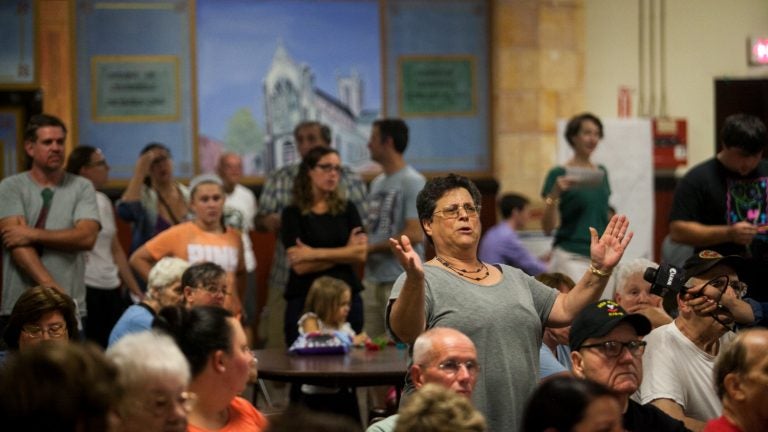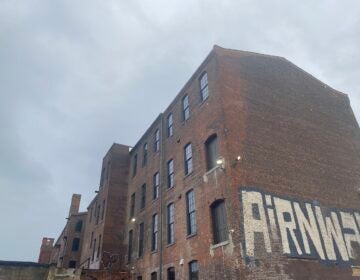New bill would protect neighborhood groups from lawsuit-happy developers
The bill would make city funds for insurance available to all registered community groups that hold zoning meetings regarding new development projects in their neighborhoods.

Residents of Fishtown were provided an open forum to voice their opinions on a proposal to convert Saint Laurentius Church into twenty-three apartments. (Brad Larrison for WHYY, file)
City Councilman Bobby Henon has introduced a bill that would make city funds for insurance available to all registered community groups that hold zoning meetings regarding new development projects in their neighborhoods. A response to a spate of lawsuits that nearly put several of prominent civic associations out of business, the proposed legislation intends to protect neighborhood groups against lawsuits intended to silence their voices as projects go under public review.
“These are groups organized in a free and voluntary capacity that really ensure quality of life in our neighborhoods,” said Henon. “For frivolous lawsuits to be put on them just because people have the resources to do so is unfair.”
The legislation would cover Registered Community Organizations (RCOs), the designation for those groups that are certified by the city to review zoning tweaks. Developers are required to alert the local RCO when they are proposing a zoning change, or a project large enough to trigger Civic Design Review, and then hold a meeting with the concerned community association. Although the recommendations made at these meetings are not binding, the Zoning Board of Adjustment (ZBA) can find them persuasive.
Neighborhood zoning meetings are often contentious and developers are sometimes subjected to withering scorn. Civic associations say that these kinds of fraught interactions with real estate actors can result in revenge-minded lawsuits, especially if a ZBA vote doesn’t go a developer’s way. The term Strategic Lawsuits Against Public Participation (SLAPP) is meant to describe cases where powerful actors with resources sue simply to intimidate and immobilize smaller actors.
Being named in a lawsuit, no matter how frivolous or bloody-minded, sends the costs of directors and officers (D&O) insurance skyrocketing. Without that protection, however, an RCO’s leadership can end up personally on the hook if the group gets sued.
Philadelphia’s civic associations want protection against such suits, especially because they say the danger is greater because the city made them quasi-governmental bodies with the creation of the RCO-designation during the 2012 zoning rewrite.
“The city deputized us under the zoning code, so they should insure us,” said Jeff Hornstein, president of the Crosstown Coalition, an umbrella group for RCOs across the city. “Many of us are in a precarious position just by doing what many of our communities expect us to do, which is weigh in on [zoning] variance requests.”
Henon’s bill is open-ended and doesn’t exactly do what Hornstein’s Crosstown Coalition is pushing for. Instead of directing the city to purchase a group D&O insurance plan for the city’s RCOs, Henon’s bill just authorizes the city to provide funding to “help offset the cost of D&O Insurance premiums attributable to the threat of Strategic Lawsuits Against Public Participation.”
The Director of Finance would have to report to the City Council President on the distribution of those funds every year, his legislation dictates. The bill would also vaguely empower the Planning Commission to institute guidelines for the disbursement of the funds for insurance. (That element of the legislation could be tricky, however, given that the commission’s expertise lies in RCO regulations and zoning — not insurance.)
In the past, the Kenney administration has not supported this sort of measure due to concerns about cost. Mayoral spokesman Mike Dunn said that the administration hasn’t yet seen Henon’s legislation and could not comment.
It is unclear exactly how much Henon’s proposal would cost. D&O insurance for organizations of this nature costs at least $1,000 annually and there are well over 250 RCOs in the city. Costs of up to $400,000 could be expected every year. If the city is able to buy insurance as an umbrella group, however, costs could be constrained.
“Any time costs are involved, no one is going to be enthused,” said Henon. “But we are a city of civic engagement and it is up to us to sit down and figure out a way for our communities to not be put out of business.”
At a hearing earlier this year on SLAPP suits, some longtime observers of zoning and development questioned the idea that the new RCO-designation made neighborhood groups more vulnerable to litigation. After all, civics were heavily involved with such disputes before the zoning overhaul. The venerable Old City Civic Association (OCCA) voted itself out of existence in 2013 because of a case that dated to long before the creation of RCOs.
It is also true that the most recent examples of neighborhood groups that almost voted themselves out of existence weren’t the result of traditional SLAPP suits.
Last year, the Bella Vista Neighbors Association and the Fishtown Neighbors Association both came dangerously close to shuttering over dramatic spikes in post-lawsuit insurance costs. In neither instance, however, was the case related to a developer attempting to bigfoot the civic association. In both cases, instead, the groups were sucked into cases against former officers that revolved around idiosyncratic neighborhood issues.
But Henon’s legislation is meant to help groups subject to frivolous lawsuits no matter the intent of the litigants. And all of the RCO groups contacted about the bill embraced it, saying that it could save a lot of financial pain for community groups who already operate without D&O insurance.
Monica Allison founded Cobbs Creek Neighbors a few years ago and they’ve never had D&O insurance. But she thinks it is essential for neighborhoods to have a voice in development projects, so she’s operated despite the risk.
“Many RCOs do not have the finances to get insurance, [they] are all volunteers striving to have quality of life,” says Allison. “This bill would help protect RCOs to do what they were designed to do without the fear of having to dismantle if sued.”
WHYY is your source for fact-based, in-depth journalism and information. As a nonprofit organization, we rely on financial support from readers like you. Please give today.







